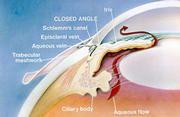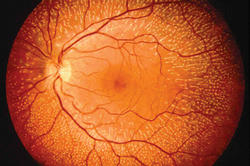Subspecialties
Home Page
Information
Contact Page
Subspecialties
Getting Involved
Residency Info
Favorite Links
Ophtho FAQ's
Subspecialties
The field of ophthalmology has many exciting subspecialties including cornea, glaucoma, neuro-op, ocular pathology, oculoplastic, ocular oncology, pediatric, and vitro-retinal.
Cataract
Cataract surgeons usually practice as generalized ophthalmologists who specialize in removing opacified lens and replacing them with an intraocular lens implant. Surgery is performed through a tiny incision while the patient is under local anesthesia. Recovery is rapid and vision is greatly improved. They also treat a variety of other eye problems ranging from eye infections and contact lens prescriptions to glaucoma and diabetic care.
Glaucoma
Glaucoma specialists treat patients who have increased intraocular pressure who without intervention will eventually become blind. Most patients can control their glaucoma with daily eye drops, but many will need additional procedures. Specialists perform numerous laser and filtration procedures to alleviate the elevated intraocular pressures. (Photo courtesy of http://www.bouldereyesurgeons.com/closedangle.jpg)
Cornea
Cornea specialists commonly overlap with refractive specialists, both specializing in the anterior segment of the eye, the cornea. They also practice as general ophthalmologists but perform penetrating keratoplasty, or corneal transplants. Additionally, these specialists will also perform refractive and corrective procedures, most commonly LASIK. More recently, cornea specialists are performing DSEAKs to replace endothelial cells in diseases such as PBK and Fuch's dystrophy.(Image courtesy of spectacle.berkeley.edu)
Neuro-Ophthalmology
Neuro-ophthalmologists specialize in treating neurologic disorders damaging the afferent and efferent visual pathways. They commonly treat problems associated with the optic nerve, cranial nerves, and the brain. Diseases include tumors, infections, inflammatory conditions, and visual disturbances resulting from strokes.
Oculoplastic
Oculoplastic surgeons specialize in treatment of the superficial eye area, such as the eyelid, tear drainage system, and the orbit. These specialists excise tumors, perform reconstructive procedures, clear drainage pathways, and correct eyelid disorders, such as droopy eyelids, or ptosis. Additionally, these surgeons may perform plastic surgeries such as brow and face lifts.
Vitreo-retinal
Vitreo-retinal ophthalmologists specialize in the posterior segment of the eye, most notably the retina. They treat a variety of diseases including macular degeneration, retinal detachment, and diabetic retinopathy. These specialists perform numerous procedures to repair damage to the retina from hemorrhages, holes, tears, and vascularization. (Photo courtesy of http://research.unc.edu/endeavors/win2005/images/retina.jpg)


